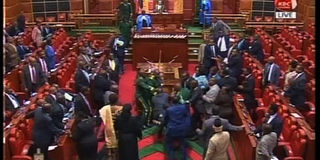Drama as MPs clash over new police laws

A screen grab of parliament proceedings on December 11, 2014 in which an MP was wrestled to the ground as Cord and Jubilee legislators clashed before a Bill meant to fight terrorism sailed through the Second Reading.
What you need to know:
- The House had to physically vote twice, first to bring to an end the debate before the scheduled two hours and secondly, to push through the Bill to the Third Stage, which is one step from the National Assembly passing it.
- The Bill might finally be passed next week when the House convenes for a special meeting to endorse the nomination of Kajiado Central MP Joseph Nkaissery as the Interior Affairs Cabinet Secretary. The House had formally adjourned until February 10, 2015.
- He was supported by Mr Duale, who said he would propose an amendment to the clause to give the President powers to sack the two deputy Inspectors-General, who served alongside former police boss David Kimaiyo.
An MP was last evening wrestled to the ground in the House as Cord and Jubilee legislators clashed before a Bill meant to fight terrorism sailed through the Second Reading.
Jubilee Coalition MPs used their numerical strength to vote through the Security Laws (Amendments) Bill 2014, which gives President Uhuru Kenyatta more powers over security bosses and the government more leeway in the fight against terrorism.
But the proposed law also takes away protected rights.
The House had to physically vote twice, first to bring to an end the debate before the scheduled two hours and secondly, to push through the Bill to the Third Stage, which is one step from the National Assembly passing it.
When the House rose to vote on the Bill, ODM MPs Fred Outa (Nyando) and Abdullahi Diriye (Wajir South) grabbed the mace — the symbol of National Assembly’s authority — in a bid to stop the proceedings.
However, the two were cornered by National Assembly orderlies who wrestled Mr Outa to the ground and retrieved the mace before the MPs could run out of the chamber with it.
The Bill might finally be passed next week when the House convenes for a special meeting to endorse the nomination of Kajiado Central MP Joseph Nkaissery as the Interior Affairs Cabinet Secretary. The House had formally adjourned until February 10, 2015.
Nearly all MPs from the Jubilee coalition led by Leader of Majority Aden Duale and parliamentary Committee on Administration and National Security chairman Asman Kamama spoke strongly in favour of the Bill, saying it would boost the fight against terrorism in the country.
But this was met with stiff opposition from Cord MPs led by Budalang’i’s Ababu Namwamba, who termed the Bill “draconian, repressive and unconstitutional”.
SECURITY TENURE
Mr Kamama initiated debate on the Bill, singling out amendments proposing the removal of the security of tenure of the Inspector-General of Police and the Director General of the National Intelligence Service (NIS), saying they would give the President a free hand to crack down on inept security chiefs.
“The President must be given the powers to deal with the Inspector-General of Police and the Director General of NIS if they do not deliver,” Mr Kamama said.
He was supported by Mr Duale, who said he would propose an amendment to the clause to give the President powers to sack the two deputy Inspectors-General, who served alongside former police boss David Kimaiyo.
“If this House agrees to remove the security of tenure of the IG, I will move an amendment to ensure that those deputies who served with Kimaiyo also go,” he said.
Mr Kamama noted that the Bill, by creating a single command structure at all levels, would cure the problem of power struggle between the Regular and Administration Police, which was adversely affecting the fight against insecurity.
“The Bill proposes a single commander who we can hold responsible for any failures in the fight against insecurity, the buck stops with him,” said Mr Kamama.
Mr Namwamba and his Mbita counterpart Millie Odhiambo, criticised the Bill, saying it reversed the democratic gains achieved through the enactment of the Constitution in 2010.
Mr Namwamba likened yesterday’s debate to the events of June 1982 when Parliament passed a law declaring Kenya a one-party state.
“This law is draconian, it is retrogressive, it is unconstitutional, it entrenches impunity,” said the Budalang’i MP. “That is why I am dressed like a man at a funeral because we are today mourning the death of the Constitution.”
Ms Odhiambo likened the Bill to the repealed Chief’s Authority Act, saying it curtailed fundamental freedoms of Kenyans to gather in public places.
“By passing this Bill, we are setting our house on fire; we are back to the days of the Chief’s Authority Act where you as a member of Parliament will be arrested and jailed for 20 years for merely addressing your constituents,” she stated, citing a clause giving Cabinet secretaries powers to approve political rallies and demonstrations.
IMPUNITY ENTRENCHED
Tongaren MP Eseli Simiyu warned that the Bill would roll back the gains brought by the Constitution.
“The problem is not about lack of laws in this country. The problem is the lack of implementation of the existing laws,” said Dr Simiyu.
Tempers flared when Ugunja MP Opiyo Wandayi, while opposing the Bill, accused the country’s founding father Mzee Jomo Kenyatta and retired President Daniel Moi of entrenching impunity and disrespect for the rule of law.
Mr Duale, on a point of order, accused Cord MPs of harbouring bitterness against the Jubilee Government because Mr Raila Odinga had failed to capture power.
“They are bitter because the son of Odinga was not elected the president while here I am, a son of a peasant is serving as the Leader of Majority in Parliament,” Mr Duale hit back.






